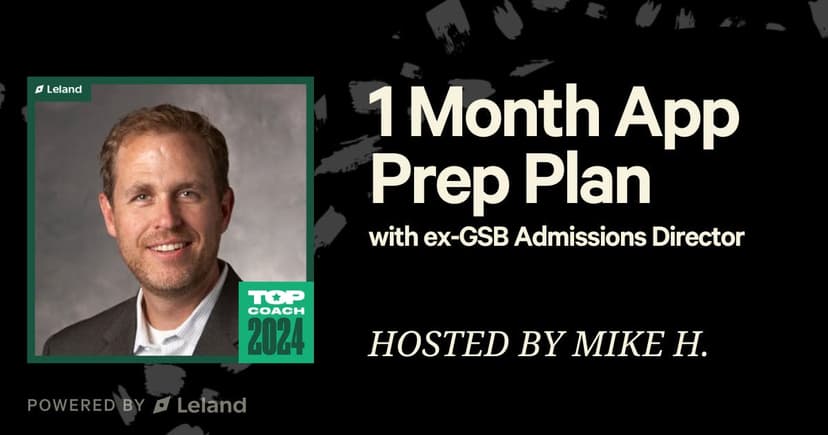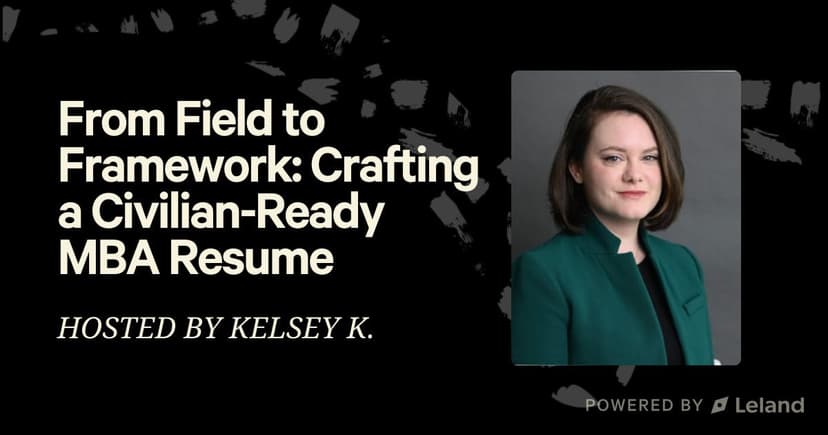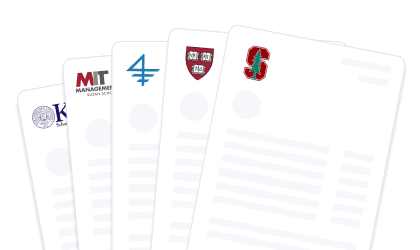The Top MBA Programs for Quantitative Finance
Want a quant career in finance? These top MBA programs offer the analytics, STEM focus, and recruiting pipelines to help you get there.
Posted June 18, 2025

Join a free event
Learn from top coaches and industry experts in live, interactive sessions you can join for free.
Table of Contents
If you're aiming for a career at the intersection of business strategy and data-driven decision-making, an MBA in quantitative finance could be your best next step. Whether you want to work in asset management, risk analytics, or fintech, top companies in the financial services industry are looking for leaders who can blend sharp business insight with technical fluency.
In this guide, we’ll highlight the best MBA programs for quantitative finance, what makes each unique, and how to choose one that aligns with your long-term goals. If you’re serious about making an impact in today’s finance world, you’re in the right place.
What Is an MBA in Quantitative Finance?
An MBA in Quantitative Finance is a graduate business degree that combines advanced financial theory with quantitative methods, data analytics, and technical modeling. These programs prepare students for roles in investment banking, asset management, and risk analysis by emphasizing math-heavy coursework like statistics, financial engineering, and programming alongside traditional MBA leadership and management training.
How is it different from a general finance MBA?
A general finance MBA gives you a solid foundation in core areas like corporate finance, accounting, and capital markets. It’s a great fit if you're aiming for roles in financial planning, consulting, or broader business leadership where strategic thinking and financial fluency matter more than advanced math.
But if you're drawn to the technical side of finance, think modeling volatility, building pricing algorithms, or optimizing portfolios, then an MBA in Quantitative Finance is the sharper tool. It’s designed for problem-solvers who love numbers, patterns, and precision. You’ll go deep into topics like stochastic calculus, machine learning for trading, and risk modeling.
In short: if you're targeting hedge funds, investment banks, or fintech roles where the math drives the money, this is the more rigorous, analytical track. It’s not for everyone, but if it clicks, it opens doors to some of the most intellectually demanding and high-paying roles in finance.
Read: What is an MBA Degree? An Expert Guide
What’s the Difference Between Quant vs. Traditional MBA in Finance?
Quantitative Finance MBA vs. Traditional Finance MBA
| Category | Quantitative Finance MBA | Traditional Finance MBA |
|---|---|---|
| Focus Area | Advanced math, modeling, statistics, and computation | Broad finance principles, corporate strategy, accounting |
| Ideal Career Paths | Quant analyst, algorithmic trader, hedge fund associate, fintech quant | Investment banking, corporate finance, FP&A, consulting |
| Curriculum Emphasis | Stochastic modeling, financial engineering, machine learning | Corporate finance, capital markets, M&A, financial reporting |
| Technical Rigor | High: heavy on math, coding (Python/R), and statistics | Moderate: focus on concepts, frameworks, and decision-making |
| Key Skills Gained | Data science, coding, quantitative modeling, risk analytics | Financial analysis, valuation, budgeting, strategic thinking |
| Who It’s For | Students with strong math/tech backgrounds who enjoy data-driven problem-solving | Students interested in broader business applications of finance |
| Common Employers | Hedge funds, investment banks (quant desks), fintech firms, trading platforms | Consulting firms, corporate finance teams, traditional banks |
| Post-MBA Roles | Quant strategist, risk modeler, portfolio analyst, fintech product manager | Finance manager, financial consultant, investment banker |
| Entry Requirements | Often prefers a strong math, engineering, or comp sci background | Open to a wider range of undergraduate backgrounds |
Learn more: The Best MBA Programs in Finance
Top MBA Programs for Quantitative Finance
1. Harvard Business School
- Sample Course:
- Applied Quantitative Finance and Machine Learning
- Finance I & Finance II – Core analytics-heavy finance sequence covering DCF valuation, risk modeling, capital markets, and complex investment decisions
- PrivateEquity Finance – Advanced course on valuation, deal structuring, and risk in private equity investing.
For more details, visit the HBS MBA Curriculum
Application Rounds:
- Round 1: September 3, 2025
- Decision: December 10, 2025
- Round 2: January 5, 2026
- Decision: March 25, 2026
Applied Quantitative Finance and Machine Learning is designed to give students a practical, insider look at how quantitative finance operates in the real world, especially within top-tier institutions like investment banks, hedge funds, and asset managers. In addition to these pillars, the course introduces machine learning and AI techniques used in finance today. It’s ideal for students who want to break into or move up in quantitative finance by gaining both technical skills and critical industry knowledge.
Read: Harvard Business School — MBA Program & Application Overview
2. Stanford Graduate School of Business
Sample Course:
- Quantitative Methods for Finance
- Managerial Finance (FINANCE 204/210) – Covers valuation, derivatives, risk management, capital structure, with a quantitative emphasis
- Finance with Derivatives & Risk Applications – Advanced options and risk modeling integrated into MBA electives (e.g., FINANCE 210).
For more details, visit the Stanford MBA Program & Courses
Application Rounds:
- Round 1: September 9, 2025
- Decision: December 10, 2025
- Round 2: January 8, 2026
- Decision: April 3, 2026
- Round 3: April 7, 2026
- Decision: May 29, 2026
Stanford GSB's MBA program emphasizes analytical rigor and innovation, offering courses that delve into quantitative methods applied to financial decision-making. Students benefit from the school's proximity to Silicon Valley, gaining exposure to cutting-edge financial technologies and practices. Courses cover topics such as financial modeling, risk management, and the application of machine learning in finance. The program's flexibility allows students to tailor their studies to align with specific interests in quantitative finance.
Read: Stanford GSB — MBA Program & Application Overview
3. The Wharton School, University of Pennsylvania
Sample Course:
- Data Science for Finance
- Advanced Investment Management – Quant portfolio optimization techniques using modern computational tools (research via Wharton curriculum).
- Risk Analytics and Management – Covers statistical techniques for enterprise risk modeling.
For more information visit the Wharton MBA Curriculum
Application Rounds:
- Round 1: September 4, 2025
- Decision: December 1,0 2025
- Round 2: January 3, 2026
- Decision: April 2, 2026
- Round 3: April 2, 2026
- Decision: May 13, 2026
Wharton's MBA program offers a Quantitative Finance major designed for students aiming to specialize in areas like quantitative asset management, financial engineering, and risk management. Courses such as Data Science for Finance and Financial Engineering provide a deep dive into the application of statistical and computational methods in finance.The program is supported by faculty actively engaged in cutting-edge research, ensuring that students are exposed to the latest developments in the field.
Read: The Wharton School — MBA Program & Application Overview
4. MIT Sloan School of Management
Sample Course:
- Analytics of Finance (15.450)
- Financial Engineering – Course on stochastic calculus, derivatives pricing, and dynamic portfolio optimization.Quantitative Methods for
- Finance – Covers econometrics, machine learning applications in finance.
For more information visit the MIT Sloan MBA Curriculum
Application Rounds:
- Round 1: September 30, 2025
- Decision: December 12, 2025
- Round 2: January 14, 2026
- Decision: April 4, 2026
- Round 3: April 7, 2026
- Decision: May 15, 2026
MIT Sloan's MBA program is renowned for its strong emphasis on analytical and quantitative skills. The Analytics of Finance course covers key quantitative methods, including financial econometrics, dynamic optimization, and derivative pricing using stochastic calculus. Students learn to apply these techniques to practical problems in portfolio management, risk management, and algorithmic trading. The program's integration with MIT's broader ecosystem provides additional opportunities for interdisciplinary learning and research.
Read: MIT Sloan School of Management — MBA Program & Application Overview
5. University of Chicago Booth School of Business
Sample Course:
- Quantitative Portfolio Management
- Stochastic Modeling for Finance – Derivative and risk modeling using probability theory.
- Computational Methods in Finance – Focus on algorithmic and numerical implementations.
For more information, visit the Chicago Booth School of Business MBA Curriculum
Application Rounds:
- Round 1: September 19, 2025
- Decision: December 5, 2025
- Round 2: January 7, 2026
- Decision: March 27, 2026
- Round 3: April 3, 2026
- Decision: May 22, 2026
Chicago Booth's MBA program offers a concentration in Analytic Finance, focusing on the application of quantitative methods to investment and risk management. The Quantitative Portfolio Management course provides advanced material relevant for portfolio managers, covering topics like optimal portfolio selection, liquidity and transaction costs, and investment strategies exploiting market inefficiencies. The program's rigorous analytical approach prepares students for careers in areas such as hedge funds, asset management, and financial consulting.
Read: Chicago Booth — MBA Program & Application Overview
6. Columbia Business School
Sample Course:
- Financial Engineering
- Stochastic Modeling for Finance
- Computational Methods in Finance
For more information, visit Columbia Business Curriculum
Application Rounds:
- Round 1: September 10, 2025
- Decision: December 20, 2025 (ED binding)
- Round 2: January 7, 2026
- Decision: March 26, 2026
- Round 3: April 1, 2026
- Decision: May 15, 2026
Columbia Business School's MBA program offers robust coursework in quantitative finance, supported by its Program for Financial Studies. Courses like Financial Engineering delve into the application of quantitative methods to solve complex financial problems, covering areas such as derivatives pricing, risk management, and portfolio optimization.
The school's location in New York City provides students with unparalleled access to the financial industry, facilitating internships and networking opportunities with leading financial institutions.
Read: Columbia Business School — MBA Program & Application Overview
7. NYU Stern School of Business
Sample Courses:
- Applied Stochastic Processes for Financial Models
- Credit Risk & Modern Portfolio Theory
- Asset Management (quant focus)
For more information, visit the NYU Stern Quantitative Finance Specialization
Deadline Info:
- Round 1: September 15, 2025
- Decision: December 1, 2025
- Round 2: January 16, 2026
- Decision: April 1, 2026
- Rolling deadlines follow
NYU Stern's MBA program offers a specialization in Quantitative Finance, providing students with a robust foundation in financial theory and quantitative methods. Courses such as Applied Stochastic Processes for Financial Models and Credit Risk delve into complex financial instruments and risk assessment techniques. The program emphasizes real-world applications, preparing students for careers in investment banking, asset management, and financial consulting.
Read: NYU Stern MBA: Acceptance Rate, Deadlines, Cost, Requirements, & Program Overview
8. Babson College – F.W. Olin Graduate School of Business
Sample Courses:
- Financial Modeling for Decision Making
- Risk Management (quant techniques)
- Investment Banking (modeling & analytics)
Babson's MBA program offers a concentration in Quantitative Finance, focusing on the application of analytical tools to financial decision-making. Courses like Financial Modeling for Decision Making and Risk Management equip students with the skills to analyze complex financial scenarios. The program's emphasis on entrepreneurship and innovation provides a unique perspective on financial strategy and risk assessment.
9. Illinois Institute of Technology – Stuart School of Business
Sample Courses:
- Financial Mathematics, Derivatives & Risk Management
- Quantitative Investment Strategies
- Computational Finance (if available)
For more information, visit the Illinois Tech Stuart MBA Program
The Stuart School of Business at Illinois Tech offers an MBA with a specialization in Quantitative Finance, blending financial theory with advanced mathematical and computational methods. Courses such as Financial Mathematics and Quantitative Investment Strategies prepare students for roles in trading, risk management, and financial engineering. The program's location in Chicago provides access to a vibrant financial community and industry partnerships.
10. University of California, San Diego – Rady School of Management
Sample Courses:
- Financial Econometrics and Empirical Methods
- Advanced Financial Risk Management
- Collecting and Analyzing Financial Data
For more information, visit the Full-Time MBA | UCSD Rady School of Management
UC San Diego's Rady School of Management offers a Master of Finance program with a strong emphasis on quantitative analysis and data-driven decision-making.
Courses like Financial Econometrics and Empirical Methods and Advanced Financial Risk Management provide students with the tools to analyze financial markets and assess risk. The program's integration of empirical data analysis prepares graduates for careers in investment management, risk assessment, and financial consulting.
How Business School Can Benefit Quantitative Finance Professionals
Business schools offer a unique learning environment that can greatly benefit professionals in the field of quantitative finance. By pursuing an MBA program, individuals can gain in-depth knowledge of financial markets, investment strategies, risk management techniques, and quantitative modeling. They can also develop essential skills such as critical thinking, problem-solving, and effective communication, which are highly valued in the finance industry.
Also, business schools often provide networking opportunities with industry professionals and access to career services that can help individuals land prestigious internships and job placements in quantitative finance firms. The rigorous curriculum and hands-on learning experiences offered by MBA programs can prepare professionals to tackle real-world situations and make informed decisions in the dynamic field of quantitative finance.
6 MBA Application Tips for People Coming From Quant Backgrounds
- Highlight your quantitative skills: When applying to MBA programs, emphasize your strong mathematical and statistical capabilities. Showcase your achievements in quantitative roles and highlight any relevant coursework or certifications you have completed.
- Emphasize your motivation: Explain why you are interested in pursuing an MBA and how it aligns with your long-term career goals in quantitative finance. Demonstrate your passion for the field and your commitment to continuous learning and professional development.
- Seek out relevant recommendations: Request recommendation letters from professors or supervisors who can attest to your analytical abilities and potential for success in quantitative finance. Their endorsement can carry significant weight in the admissions process.
- Prepare for interviews: Be ready to demonstrate your understanding of quantitative finance concepts and your ability to apply them in real-world scenarios. Practice answering behavioral and case interview questions to showcase your problem-solving and decision-making skills.
- Research program offerings: Look for MBA programs that have strong finance departments and offer specialized coursework or concentrations in quantitative finance. Consider factors such as faculty expertise, industry connections, and alumni success rates in quantitative finance roles.
- Attend networking events: Take advantage of opportunities to connect with current students, alumni, and faculty members in quantitative finance-related events. Building relationships with individuals in the field can enhance your application and provide valuable insights into the industry.
Bottom Line
By selecting the right MBA program, individuals can gain the necessary knowledge, skills, and networking opportunities to thrive in this competitive industry. Whether you are a quantitative finance professional looking to enhance your skills or someone transitioning into the field, the top MBA programs for quantitative finance offer a solid foundation and excellent career prospects.
Consider your goals, interests, and future aspirations when exploring these programs, and let them guide you toward a successful and fulfilling career in quantitative finance.
Choose the Right MBA Program for You with the Help of a Coach
Working with an expert MBA admissions coach can give you the personalized guidance you need to stand out in a competitive field. From perfecting your application to acing your interviews, our coaches are here to help you succeed.
Read next:
- Is an MBA Worth It? Pros, Cons, and How to Decide
- The 10 Best Colleges for Finance in the US
- T25 MBA Acceptance Rates, GPA, & Test Scores
- The 10 Best MBA Admissions Consultants
MBA for Quantitative Finance: FAQs and Answers
What are the typical prerequisites for MBA programs in quantitative finance?
- While specific prerequisites may vary, most MBA programs in quantitative finance require a bachelor's degree in a quantitative discipline, such as mathematics, statistics, engineering, or economics. They may also require applicants to have a minimum level of work experience.
Can I pursue an MBA in quantitative finance without a strong mathematical background?
- While a strong mathematical background is helpful, many MBA programs in quantitative finance offer preparatory courses to help students build the necessary mathematical skills. However, having a solid foundation in mathematics and quantitative methods can significantly enhance your chances of success in the program.
What career opportunities are available for MBA graduates in quantitative finance?
- MBA graduates with a focus in quantitative finance can pursue a variety of career paths, including roles in investment banking, quantitative trading, risk management, asset management, and financial consulting. They can work in financial institutions, hedge funds, investment firms, or even start their own ventures in the finance industry.
Are there any online or part-time MBA programs in quantitative finance?
- Yes, there are several online and part-time MBA programs that offer specializations or concentrations in quantitative finance. These programs provide flexibility for working professionals who want to continue their education while balancing their career and personal commitments.
How can I finance my MBA in quantitative finance?
- Many MBA programs offer scholarships, grants, and fellowships to help offset the cost of tuition. Additionally, students can explore financial aid options, such as loans or employer sponsorships. It is essential to research and consider various financing options to make an informed decision. In conclusion, pursuing an MBA program can be a significant stepping stone for individuals looking to excel in the field of quantitative finance.






























